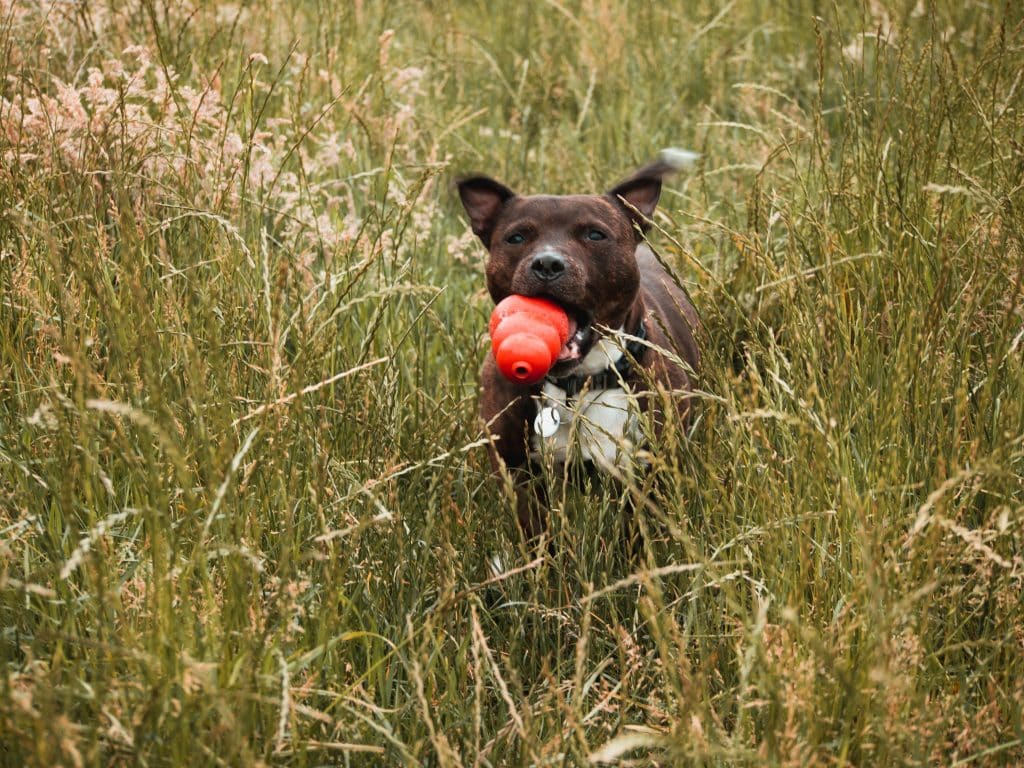Dogs are known for their endless energy levels and for bounding through fields (or through the house!) at top speed. But when age sets in, so too does joint stiffness, lethargy, and pain. Just like humans, really!
The trouble with man’s best friend is that he can’t tell you when or where he’s hurting or why. That’s why it’s important to know what might be causing his joint stiffness, and what you can do to help.
What causes stiff joints?
Just as in humans, stiff joints in dogs are often a result of wear and tear. Joint cartilage may wear away before it can be replaced, leading to pain and stiffness. Eventually, structural changes within the joint can seriously affect mobility. The cartilage within the joint may become less smooth, causing the ends of the bones to rub together. This can be terribly painful to your dog, and can also cause further damage to the cartilage.

- Age: Cartilage progressively wears away as a dog gets older. This is, sadly, a normal part of aging and becomes even more common in dogs over the age of seven.
- Breed: Some breeds are at a higher risk of stiff joints due to their genetic makeup. This includes Labrador Retrievers, Golden Retrievers, Springer Spaniels, German Shepherds, and Rottweilers. German Shepherds are great for families. Especially when it comes to protection. German Shepherd protection dogs for sale.
- Being overweight: Excess weight puts more stress on the joints and cartilage, increasing the risk of inflammation, joint damage, and painful osteoarthritis.
- Injury or trauma: Damage to joint cartilage from an injury or accident may lead to stiff joints later in life, reducing the dog’s mobility.
Why NSAIDS aren’t the ideal treatment
Veterinarians often prescribe NSAIDS (non-steroidal anti-inflammatory drugs) for dogs with osteoarthritis. However, while NSAIDs reduce ongoing pain and inflammation, they also interfere with many normal bodily functions and cause a range of side effects.
The side effects of NSAIDs usually occur in the digestive tract, kidneys, and liver, and can actually do more harm to your dog than good. Some reported side effects include vomiting, loss of appetite, decreased activity level, and diarrhea. In more serious cases, dogs who are given NSAIDs long term can end up with stomach and intestinal ulcers, stomach and intestinal perforations (holes in the wall of the stomach or intestines), or failure of the kidneys and/or liver.
Natural ways to mitigate joint stiffness in dogs
Fortunately, there are many ways to reduce the pain of joint disorders in dogs without having to resort to NSAIDs.

1. Keep your dog mobile
Allowing your pup to remain sedentary all day could worsen his pain and stiffness. Regular exercise will also help to reduce excess weight. If long walks are a struggle, try shorter, more frequent walks. In some cases, you may have to resort to a sling, rear-end harness, or cart to help keep him moving.
2. Feed a species-appropriate diet
Feeding your dog natural, anti-inflammatory foods can make a huge difference to their pain levels. Some of the best foods for dogs with arthritis are papaya, alfalfa, celery, and ginger. Traditional kibble can worsen inflammation, so a biologically appropriate diet is key here (i.e., raw). If you want to learn more about it, there is much more information out there.
3. Ensure access to fresh, clean water
Make sure your dog is getting plenty of fresh, clean water every day. Though hydration is essential for many things, it’s particularly important when it comes to proper joint function.
4. Consider alternative treatments
Treatments such as physiotherapy, laser, massage therapy, and acupuncture may also help to relieve stiffness and improve mobility. All or a combination of these may go a long way in improving the quality of your dog’s life.
5. Use an anti-inflammatory supplement
A natural anti-inflammatory dog supplement is a must. Whole-food supplements are ideal, such as feeding whole fish (like sardines) or adding a bit of coconut oil or flaxseed oil to the food for an omega-3 boost. The omega-3 fatty acids EPA and DHA are proven to reduce inflammation, support lubrication of the joints, and improve the health of a dog’s coat, heart, and brain.

Turmeric is a powerful anti-inflammatory agent that can effectively relieve the pain of joint stiffness and arthritis. Turmeric reduces inflammation and fights the harmful free radicals which cause cellular damage in the body. This can help to slow aging and degeneration, and can even increase a dog’s lifespan.
Vitamin C is required for the maintenance of connective tissue. It’s also an important antioxidant that can help reduce the pain of arthritis. Use supplements that contain calcium ascorbate or sodium ascorbate (ascorbic acid can be irritating to the stomach lining) along with flavonoids, which can also decrease inflammation.
And, of course, make sure your pup has a nice, comfortable bed to sleep on. It’s as important for an ailing dog as it is for an ailing human!













Leave a Reply